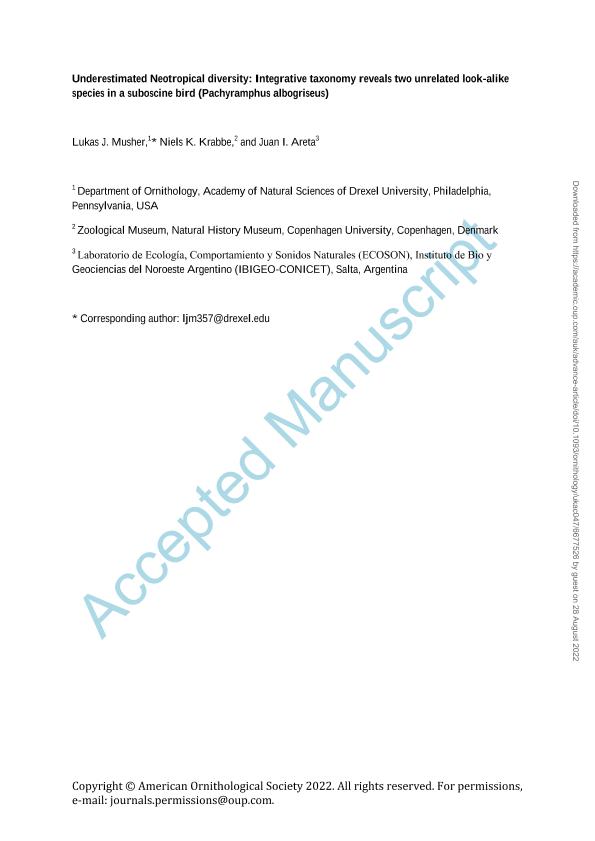Mostrar el registro sencillo del ítem
dc.contributor.author
Musher, Lukas J.
dc.contributor.author
Krabbe, Niels K.
dc.contributor.author
Areta, Juan Ignacio

dc.date.available
2024-03-13T11:00:49Z
dc.date.issued
2023-02
dc.identifier.citation
Musher, Lukas J.; Krabbe, Niels K.; Areta, Juan Ignacio; Underestimated Neotropical diversity: Integrative taxonomy reveals two unrelated look-alike species in a suboscine bird ( Pachyramphus albogriseus ); Oxford University Press; Ornithology; 140; 1; 2-2023; 1-34
dc.identifier.issn
0004-8038
dc.identifier.uri
http://hdl.handle.net/11336/230269
dc.description.abstract
We applied an integrative taxonomic framework to evaluate the systematics of the Neotropical Black-and-white Becard (Pachyramphus albogriseus Sclater 1857). Combining phylogenomic (ultraconserved elements), morphological, and vocalization data, we confirmed that this species is polyphyletic; some individuals form a clade sister to P. polychopterus and should be afforded species rank as P. salvini Richmond 1899 (Slender-billed Becard), whereas the remaining subspecies of P. albogriseus (Broad-banded Becard) are sister to P. major. We found that P. salvini differs from P. albogriseus in song, color of the lores, wing-bar width, body size, and bill width. Whereas P. albogriseus occurs in montane forest in Costa Rica and Panama (ssp. ornatus) and along the eastern slope of the Andes from northern Venezuela to southern Peru (ssp. albogriseus), P. salvini is found in the lowlands from Pacific Colombia south to northwest Peru and in the Río Marañón drainage. The latter also occurs, possibly only seasonally, along the eastern slope of the Andes, where the two species’ ranges approach closely. We treat P. a. guayaquilensis Zimmer 1936 as a junior synonym of P. salvini Richmond 1899, and P. a. coronatus Phelps and Phelps 1953 as a junior synonym of P. a. albogriseus Sclater 1857. This study provides a striking example of a major problem for comparative biology: underestimated and mischaracterized diversity. We argue that there are likely many more cases like this awaiting discovery.
dc.format
application/pdf
dc.language.iso
eng
dc.publisher
Oxford University Press

dc.rights
info:eu-repo/semantics/openAccess
dc.rights.uri
https://creativecommons.org/licenses/by-nc-sa/2.5/ar/
dc.subject
cryptic species
dc.subject
taxonomy
dc.subject
vocalizations
dc.subject.classification
Zoología, Ornitología, Entomología, Etología

dc.subject.classification
Ciencias Biológicas

dc.subject.classification
CIENCIAS NATURALES Y EXACTAS

dc.title
Underestimated Neotropical diversity: Integrative taxonomy reveals two unrelated look-alike species in a suboscine bird ( Pachyramphus albogriseus )
dc.type
info:eu-repo/semantics/article
dc.type
info:ar-repo/semantics/artículo
dc.type
info:eu-repo/semantics/publishedVersion
dc.date.updated
2024-03-12T11:12:32Z
dc.identifier.eissn
2732-4613
dc.journal.volume
140
dc.journal.number
1
dc.journal.pagination
1-34
dc.journal.pais
Estados Unidos

dc.description.fil
Fil: Musher, Lukas J.. Drexel University. Academy of Natural Sciences; Estados Unidos
dc.description.fil
Fil: Krabbe, Niels K.. Natural Historymuseun Of Copenhague. Zoological Museum Of Copenhague; Dinamarca
dc.description.fil
Fil: Areta, Juan Ignacio. Consejo Nacional de Investigaciones Científicas y Técnicas. Centro Científico Tecnológico Conicet - Salta. Instituto de Bio y Geociencias del NOA. Universidad Nacional de Salta. Facultad de Ciencias Naturales. Museo de Ciencias Naturales. Instituto de Bio y Geociencias del NOA; Argentina
dc.journal.title
Ornithology

dc.relation.alternativeid
info:eu-repo/semantics/altIdentifier/url/https://academic.oup.com/auk/advance-article/doi/10.1093/ornithology/ukac047/6677526
dc.relation.alternativeid
info:eu-repo/semantics/altIdentifier/doi/http://dx.doi.org/10.1093/ornithology/ukac047
Archivos asociados
